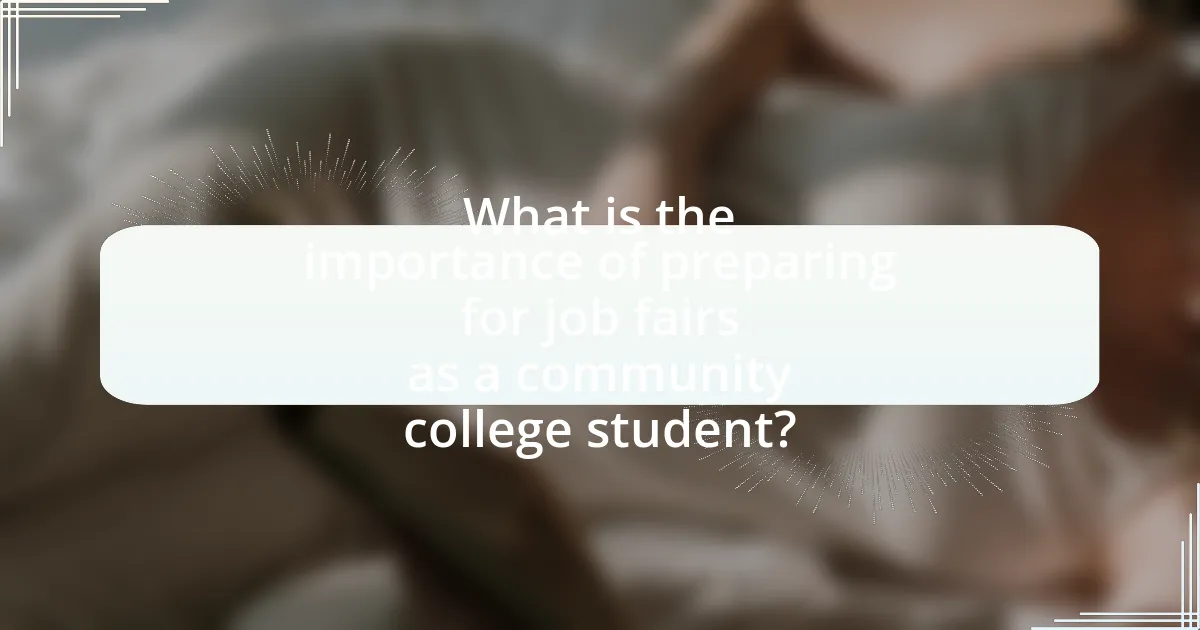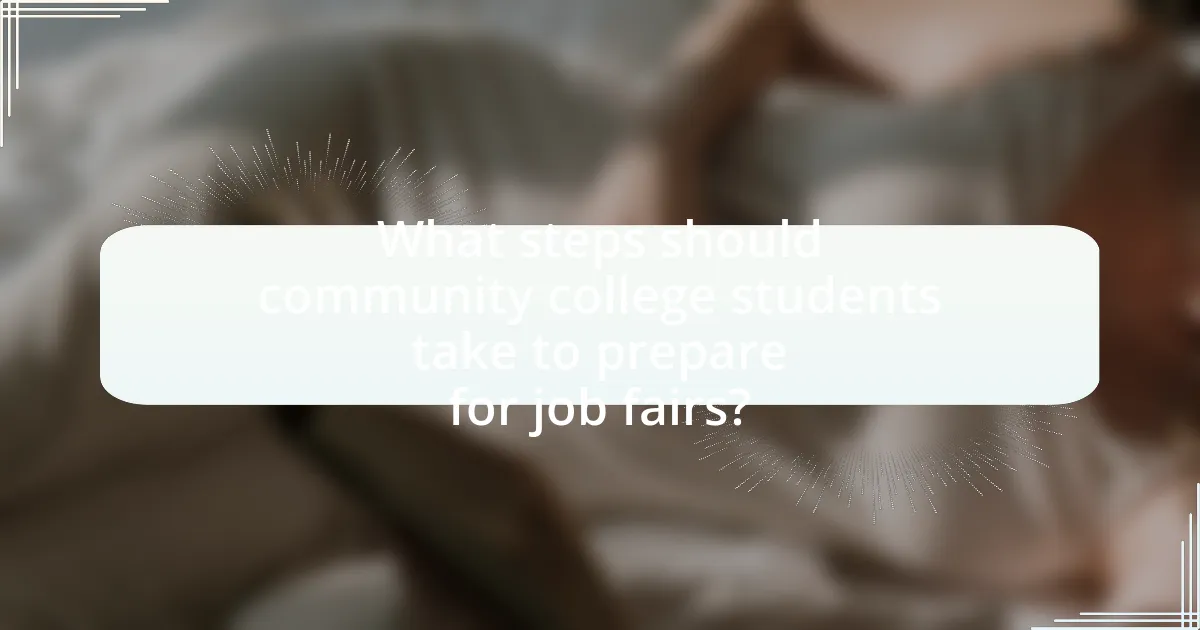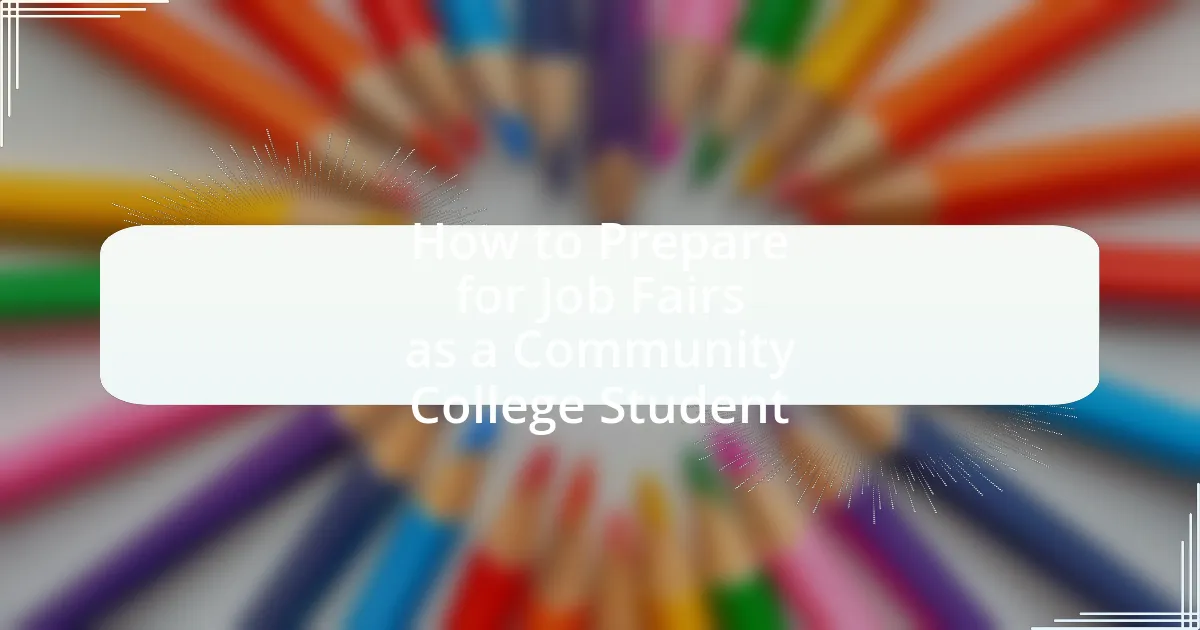The article focuses on the importance of preparation for job fairs specifically for community college students. It outlines how effective preparation enhances students’ chances of securing employment by allowing them to present themselves professionally, understand the job market, and engage with potential employers. Key topics include the benefits of job fairs, strategies for networking, essential materials to prepare, and the significance of professional attire. The article emphasizes that thorough preparation, including researching companies and practicing communication skills, is crucial for maximizing success at job fairs and improving employability.

What is the importance of preparing for job fairs as a community college student?
Preparing for job fairs is crucial for community college students as it significantly enhances their chances of securing employment opportunities. Effective preparation allows students to present themselves professionally, understand the job market, and engage meaningfully with potential employers. According to a survey by the National Association of Colleges and Employers, 70% of employers prefer candidates who demonstrate preparedness and professionalism during job fairs. This preparation includes researching companies, practicing elevator pitches, and tailoring resumes, which collectively increase a student’s confidence and effectiveness in networking.
How can job fairs benefit community college students?
Job fairs can significantly benefit community college students by providing direct access to potential employers and networking opportunities. These events allow students to meet with hiring managers, learn about job openings, and gain insights into various industries. According to a survey by the National Association of Colleges and Employers, 70% of employers reported that they use job fairs as a primary recruitment tool, highlighting their effectiveness in connecting students with job opportunities. Additionally, job fairs often feature workshops and resources that help students improve their resumes and interview skills, further enhancing their employability.
What opportunities do job fairs provide for networking?
Job fairs provide significant opportunities for networking by connecting job seekers directly with employers and industry professionals. These events facilitate face-to-face interactions, allowing attendees to establish personal relationships, ask questions, and gain insights into various companies and career paths. According to the National Association of Colleges and Employers, 70% of jobs are found through networking, highlighting the importance of these connections made at job fairs. Additionally, job fairs often include workshops and panel discussions, further enhancing networking opportunities by allowing participants to engage with experts and peers in their field.
How do job fairs enhance job search skills?
Job fairs enhance job search skills by providing direct interaction with employers and industry professionals. This face-to-face engagement allows job seekers to practice their networking abilities, refine their elevator pitches, and receive immediate feedback on their resumes and interview techniques. According to a study by the National Association of Colleges and Employers, 70% of employers prefer candidates who have participated in job fairs, indicating that these events significantly improve candidates’ visibility and employability.
Why is preparation essential before attending a job fair?
Preparation is essential before attending a job fair because it significantly enhances a candidate’s ability to make a positive impression on potential employers. By researching participating companies and understanding their job openings, candidates can tailor their resumes and elevator pitches to align with the employers’ needs. A study by the National Association of Colleges and Employers found that 70% of employers prefer candidates who demonstrate knowledge about their organization during interviews. This preparation not only boosts confidence but also increases the likelihood of securing interviews and job offers.
What are the risks of attending a job fair unprepared?
Attending a job fair unprepared poses significant risks, including missed networking opportunities and a negative impression on potential employers. Without preparation, individuals may struggle to articulate their skills and experiences, leading to ineffective communication that can hinder job prospects. Research indicates that candidates who are well-prepared are 50% more likely to secure interviews compared to those who are not. Additionally, unprepared attendees may fail to research companies, resulting in an inability to ask informed questions, which can diminish their appeal to recruiters. Overall, lack of preparation can severely limit the effectiveness of participation in job fairs.
How does preparation increase confidence during job fairs?
Preparation increases confidence during job fairs by equipping individuals with the knowledge and skills necessary to engage effectively with potential employers. When students research companies, practice their elevator pitches, and prepare tailored resumes, they feel more competent and ready to handle interactions. A study by the National Association of Colleges and Employers found that candidates who prepare thoroughly are perceived as more professional and are more likely to make a positive impression, which reinforces their self-assurance. This preparation not only enhances their ability to answer questions but also allows them to ask insightful questions, further boosting their confidence in the job fair environment.

What steps should community college students take to prepare for job fairs?
Community college students should take several key steps to prepare for job fairs. First, they should research the companies attending the fair to understand their values, job openings, and industry trends. This preparation allows students to tailor their resumes and conversations effectively. Second, students should update their resumes and cover letters, ensuring they highlight relevant skills and experiences that align with the positions they are interested in. Third, practicing elevator pitches helps students articulate their strengths and career goals succinctly. Additionally, students should dress professionally to make a positive first impression. Finally, following up with employers after the fair through thank-you emails can reinforce their interest and keep them on the employer’s radar. These steps enhance students’ chances of making meaningful connections and securing job opportunities.
How can students research companies attending the job fair?
Students can research companies attending the job fair by utilizing online resources, reviewing company websites, and leveraging social media platforms. Online resources such as job fair websites often provide lists of participating companies, along with links to their official sites, which contain valuable information about their mission, values, and job openings. Additionally, students can use LinkedIn to explore company profiles, employee reviews, and recent news, which can offer insights into company culture and industry trends. Researching these sources equips students with the knowledge needed to engage effectively with recruiters and tailor their questions during the fair.
What resources are available for researching potential employers?
Resources available for researching potential employers include company websites, professional networking platforms like LinkedIn, and job review sites such as Glassdoor. Company websites provide insights into their mission, values, and job openings, while LinkedIn allows users to view employee profiles and company updates. Glassdoor offers employee reviews and salary information, helping candidates gauge workplace culture and compensation. These resources collectively enable job seekers to make informed decisions about potential employers.
How can students identify which companies align with their career goals?
Students can identify companies that align with their career goals by conducting thorough research on industries of interest and analyzing company values, mission statements, and job descriptions. This process involves utilizing resources such as LinkedIn, company websites, and industry reports to gather information about potential employers. For instance, a survey by the National Association of Colleges and Employers found that 70% of employers prioritize candidates whose values align with their company culture, highlighting the importance of this alignment in the job search process.
What materials should students prepare before the job fair?
Students should prepare several key materials before attending a job fair, including updated resumes, business cards, and a professional portfolio. Updated resumes are essential as they provide potential employers with a concise overview of a student’s skills, education, and work experience, which is critical for making a strong first impression. Business cards facilitate networking by allowing students to share their contact information easily, enhancing follow-up opportunities after the event. A professional portfolio, which may include work samples, projects, or relevant certifications, showcases a student’s capabilities and achievements, further supporting their candidacy. Collectively, these materials equip students to engage effectively with employers and maximize their job fair experience.
How important is having a polished resume for job fairs?
Having a polished resume is crucial for job fairs as it significantly enhances a candidate’s chances of making a positive impression on potential employers. A well-crafted resume showcases professionalism, attention to detail, and the candidate’s qualifications effectively. Research indicates that employers often make hiring decisions based on the first impression created by a resume, with 75% of recruiters stating that they can determine a candidate’s suitability within the first 30 seconds of reviewing a resume. Therefore, a polished resume not only reflects a candidate’s skills and experiences but also demonstrates their commitment to the job search process, making it an essential tool for success at job fairs.
What other documents should students bring to a job fair?
Students should bring multiple copies of their resumes to a job fair. Additionally, they should consider bringing a cover letter tailored to specific employers, a list of references, and transcripts or certifications relevant to their field of study. These documents enhance their professional presentation and provide potential employers with comprehensive information about their qualifications and skills. Having these materials readily available can significantly improve a student’s chances of making a positive impression and securing job opportunities.
What strategies can enhance a community college student’s experience at job fairs?
To enhance a community college student’s experience at job fairs, students should engage in thorough preparation, including researching participating companies and tailoring their resumes to align with job descriptions. This preparation allows students to approach potential employers with informed questions and relevant skills, increasing their chances of making a positive impression. According to a study by the National Association of Colleges and Employers, 70% of employers prefer candidates who demonstrate knowledge about their organization during interviews, highlighting the importance of research. Additionally, practicing networking skills and developing an elevator pitch can help students effectively communicate their strengths and career goals, further improving their interactions at job fairs.
How should students approach networking at job fairs?
Students should approach networking at job fairs by preparing a clear elevator pitch and actively engaging with employers. This involves succinctly introducing themselves, highlighting their skills and experiences relevant to the positions they seek. Research indicates that effective networking can lead to job opportunities; for instance, a survey by the National Association of Colleges and Employers found that 85% of jobs are filled through networking. Therefore, students should also prepare questions to ask employers, demonstrating genuine interest and facilitating meaningful conversations. Additionally, following up with contacts after the event can reinforce connections made during the fair.
What are effective ways to introduce oneself to employers?
Effective ways to introduce oneself to employers include preparing a concise elevator pitch that highlights relevant skills and experiences. This pitch should be tailored to the specific employer and job role, demonstrating an understanding of the company’s values and needs. Research shows that a well-structured introduction can significantly increase the likelihood of making a positive impression, as employers often appreciate candidates who can communicate their qualifications clearly and confidently. Additionally, maintaining eye contact, offering a firm handshake, and displaying enthusiasm can further enhance the introduction, making it memorable for the employer.
How can students follow up with contacts made at job fairs?
Students can follow up with contacts made at job fairs by sending personalized thank-you emails within 24 to 48 hours after the event. This prompt communication reinforces their interest and helps establish a connection. In the email, students should reference specific conversations or topics discussed during the fair to demonstrate genuine engagement. According to a survey by CareerBuilder, 70% of employers appreciate follow-up messages, indicating that timely communication can positively influence hiring decisions.
What tips can help students stand out during job fairs?
To stand out during job fairs, students should prepare a tailored resume and practice their elevator pitch. A tailored resume highlights relevant skills and experiences specific to the employers they are targeting, making it easier for recruiters to see the student’s fit for the role. Practicing an elevator pitch allows students to confidently introduce themselves and articulate their career goals and qualifications succinctly. According to a survey by the National Association of Colleges and Employers, 80% of employers prefer candidates who can effectively communicate their value in a brief interaction. Additionally, students should dress professionally and engage actively with recruiters, demonstrating enthusiasm and interest in the companies they approach.
How can students effectively communicate their skills and experiences?
Students can effectively communicate their skills and experiences by utilizing clear and concise language, tailoring their messages to the audience, and employing specific examples that demonstrate their competencies. For instance, when discussing teamwork skills, a student might reference a group project where they played a key role in achieving a successful outcome, thereby providing tangible evidence of their abilities. Additionally, using a structured format, such as the STAR method (Situation, Task, Action, Result), can help students articulate their experiences in a compelling way. This method not only organizes their thoughts but also highlights the impact of their contributions, making their communication more persuasive and memorable.
What role does professional attire play in making a good impression?
Professional attire plays a crucial role in making a good impression by conveying competence and respect for the occasion. When individuals dress appropriately for job fairs, they signal to potential employers that they take the opportunity seriously and are prepared to engage in a professional setting. Research indicates that first impressions are formed within seconds, and attire significantly influences perceptions of professionalism and capability. A study published in the Journal of Experimental Social Psychology found that individuals dressed in formal clothing were perceived as more competent and trustworthy compared to those in casual attire. This evidence underscores the importance of professional attire in establishing a positive initial interaction at job fairs.
What are the best practices for maximizing success at job fairs?
To maximize success at job fairs, community college students should prepare thoroughly by researching participating companies, tailoring their resumes, and practicing their elevator pitches. Researching companies allows students to engage meaningfully with recruiters, demonstrating genuine interest and knowledge about the organization. Tailoring resumes to highlight relevant skills and experiences increases the likelihood of standing out among other candidates. Practicing elevator pitches ensures students can effectively communicate their strengths and career goals in a concise manner, which is crucial in a fast-paced job fair environment. These practices are supported by studies indicating that preparation significantly enhances job seekers’ confidence and effectiveness in networking situations.

Leave a Reply